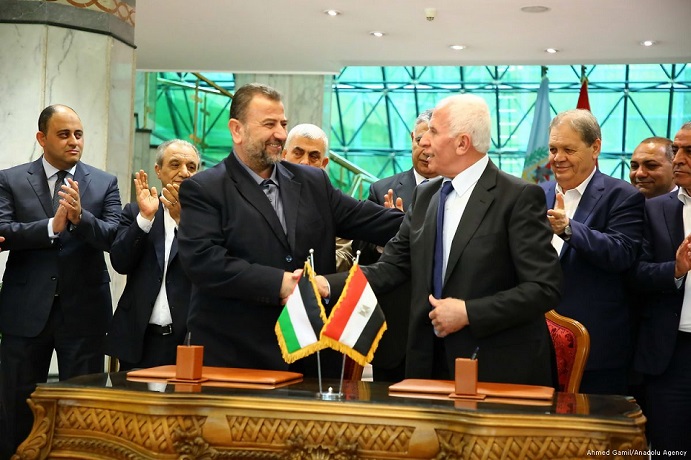
Middle East Monitor / September 10, 2020
Senior officials from Fatah and Hamas, along with those from other Palestinian organisations, are discussing the creation of committees to expedite the decisions taken at the secretary general-level meeting held in Beirut last week. On the agenda will be mechanisms to end the political split that has plagued the Palestinians for more than a decade. It is intended that the Palestine Liberation Organisation’s executive committee will discuss the outcomes of that meeting and make sure that decisions are acted upon.
The officials from Hamas and Fatah are working on a consensus about the committees’ modus operandi, and the people to serve on them, especially the reconciliation committee. A well-placed source within Fatah told Al-Quds al-Arabi that the discussion is constructive and that the consensus reached on the practical steps to address Israel’s annexation plans and the UAE’s normalisation deal still holds. Indeed, it is said that it has become stronger following the meeting last Thursday.
Nominations for committee membership are being submitted by the Palestinian factions, along with independents. The intention is to work according to previous agreements signed by the factions and unite in the face of the plots threatening the Palestinian cause. It is expected that the make-up of the committees will be announced early next week.
According to Salah Al-Arouri, deputy to the Head of the Hamas Political Bureau, the movement is communicating with Fatah on a daily basis to ensure successful outcomes. There is agreement with Fatah on three paths to meet the challenges, he explained. The factions’ stance against Donald Trump’s “peace plan” is unanimous.
Fatah’s Central Committee member Ahmad al-Hels, meanwhile, said that conditions are now favourable to move towards national unity through which all challenges can be met. Al-Hels added that the meeting last week sent a strong message to the world and their enemies that the Palestinians have high hopes and look forward to the practical realisation of what was agreed in Beirut. He pointed out that the five-week deadline given by President Mahmoud Abbas will be more than enough to see concrete results.
A second committee will outline a plan to organise and form a unified leadership for popular resistance to the Israeli occupation, with PLO support. Such resistance, it was noted, is the appropriate choice at this moment.
Hamas leader Ismail Haniyeh followed his attendance at the Beirut meeting with a call for the formation of a national unity government with specific roles to help end the split. “A West Bank and Gaza Strip national unity government that undertakes three missions could end the split,” he insisted. His deputy Al-Arouri confirmed that Hamas will firmly start work on these paths, with a consensus, which will bring about strategic and practical changes through the PLO.












